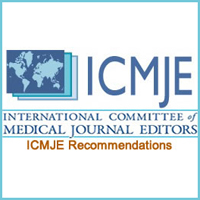Honorary authorship in Geriatric Literature: do authors adhere to the ICMJE-guidelines?

Submitted: 4 July 2020
Accepted: 4 September 2020
Published: 1 October 2020
Accepted: 4 September 2020
Abstract Views: 427
PDF: 286
HTML: 11
HTML: 11
Publisher's note
All claims expressed in this article are solely those of the authors and do not necessarily represent those of their affiliated organizations, or those of the publisher, the editors and the reviewers. Any product that may be evaluated in this article or claim that may be made by its manufacturer is not guaranteed or endorsed by the publisher.
All claims expressed in this article are solely those of the authors and do not necessarily represent those of their affiliated organizations, or those of the publisher, the editors and the reviewers. Any product that may be evaluated in this article or claim that may be made by its manufacturer is not guaranteed or endorsed by the publisher.

 https://doi.org/10.4081/gc.2020.9227
https://doi.org/10.4081/gc.2020.9227




